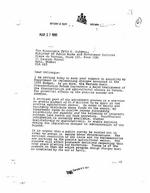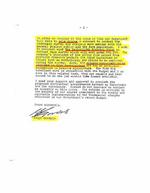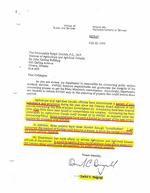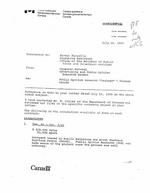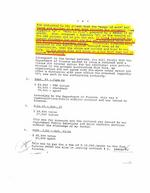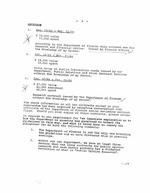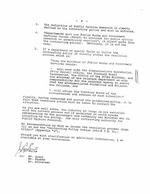Claude Dauphin was a Quebec Liberal MNA for the riding of Marquette in 1981 and was re-elected in 1985 and 1989. He served as an MNA until 1994. In 1995 he was the president of Option Canada. He was the chief Quebec advisor to Paul Martin when the current Prime Minister was Minister of Finance in 1997. In 2001, Dauphin was elected as a city councillor in Lachine and currently serves as the Montreal borough’s mayor after he was elected in November 2005.
Claude Dauphin and Option Canada have been at the centre of controversy before. Gilles Duceppe and other sovereigntists questioned a transfer of $4.8 million from the Ministry of Heritage to Option Canada in circumvention of the laws governing spending on the Quebec 1995 referendum. According to a November 20th, 1997 Montreal Gazette article, the secretive Option Canada had originally requested $10 million.
In the 1995-96 transfer payments summary, on page 8 of 82, under a section titled “Grants to organization representing official language minority communities, non-federal public administrations and other organizations for the purpose of furthering the use, acquisition and promotion of the official languages”, a $4,810,000 payment to Option Canada from Montreal, Quebec is listed.

Heritage Canada doled out the amount in three distributions, one of which for $300,000 seems to have gone missing.
As Angry in the Great White North reports, Heritage Canada called in the Mounties after learning about the upcoming book of an investigative journalist.
However, an official at Canadian Heritage said the department called in the police after hearing that Option Canada was the focus of an upcoming book by Quebec investigative journalist Normand Lester.
Various information led us to believe that there were possible irregularities in the management of federal funds and it’s in that optic that we asked the RCMP to look more closely at the matter,” Heritage spokesman Jean-Guy Beaupré said.
Another investigation into Option Canada was earlier conducted by Quebec’s chief electoral officer Francois Casgrain.
The report also states that Option Canada may have been a “bogus firm,” set up by its parent organization, the Council for Canadian Unity, to avoid problems with Revenue Quebec and Revenue Canada.
In fact, this makes sense as the CCU is a think-tank that would lose tax-exempt status if it were to directly engage the separatists. Thus, a shell corporation was formed and was named Option Canada.
Casgrain remarked:
“One cannot help but wonder,” he wrote, “whether Option Canada was ever in fact operational, instead of merely a bogus firm (‘une compagnie bidon’) whose sole purpose was to assume (referendum) expenses already incurred by the Council for Canadian Unity, thereby providing the accounting loophole that would calm Revenue Quebec and Revenue Canada.”
The Globe and Mail casts further doubt upon Option Canada and regular accounting procedures:
An internal review at Canadian Heritage criticized the disbursements, saying the process “lacked the rigour and scrutiny one would expect for such large sums of money being given to an unproven client.
In fact, in the past, Dauphin has all but confirmed the dodgy nature of the faux-enterprise that channelled millions from Heritage Canada to Quebec ad firms (one of which was BCP, the role of which was investigated and reported upon by Justice John Gomery).
According to the Gazette,
The detail of Option Canada’s activities remain a mystery. Its founding president, Claude Dauphin, who declared himself an early contender for Warren Allmand’s federal seat in N.D.G., couldn’t recall in a Feb. 28 interview what it was that Option Canada did during the campaign.
According to Dauphin, Option Canada’s president, the corporation was CCU’s “political arm.”
Pressed to explain how it was possible that he didn’t know what its role was during the campaign, Dauphin shrugged and replied: “Just because I lent my name as president doesn’t mean I ran the company.”
Here, Dauphin distances himself from Option Canada after questions arise surrounding its potentially illegal conduct during the 1995 referendum. The truth remains however, that Option Canada did indeed exist if only as a shell corporation and did indeed channel $4.8 million from the federal treasury to various destinations. About $2.6 million of this money went to the Quebec ad firm BCP and other amounts remain unaccounted for today. According to today’s Globe and Mail, the RCMP may have initiated the review to investigate $300,000 in misdirected money.
Why is this important in the current context of the election?
- This brings Adscam back into the spotlight
- The RCMP is investigating the Liberals on another scandal
- Dauphin is closely linked to Paul Martin
- This makes Martin’s claims of ignorance towards Adscam increasingly unbelievable.
Ironically, Dauphin described his former boss Paul Martin prior to the 2004 federal election:
“Son style est différent, explique-t-il en entrevue téléphonique. Probablement que M. Chrétien aurait dit, comme il l’a déjà fait: ‘allez donc faire du faire du ski alpin, ne pensez pas à ca’. M. Martin, lui, a pris le taureau par les cornes et il a dit: ‘avec des enquêtes, on va trouver les coupables pour montrer aux Canadiens qu’on prend ca au sérieux’. Certains peuvent dire que stratégiquement, c’était en quelque sorte amplifier le dossier, mais je crois qu’apràs mure réflexion, les Canadiens vont regarder ca et dire: ‘il essaie vraiment d’aller au fond des choses’.”
(“His style is different”, Dauphin explains in a telephone interview. “Mr. Chretien probably would have said “Go skiing, don’t think of it”. Mr. Martin took the bull by the horns and he said, ‘regarding the investigations, we’ll find the guilty parties to show Canadians that we take things seriously’. Some can say that strategically, it was to some extend to highlight the file, but I believe that after careful consideration, Canadians will look at this and say: ‘he’s really trying to get to the bottom of things.'”)
